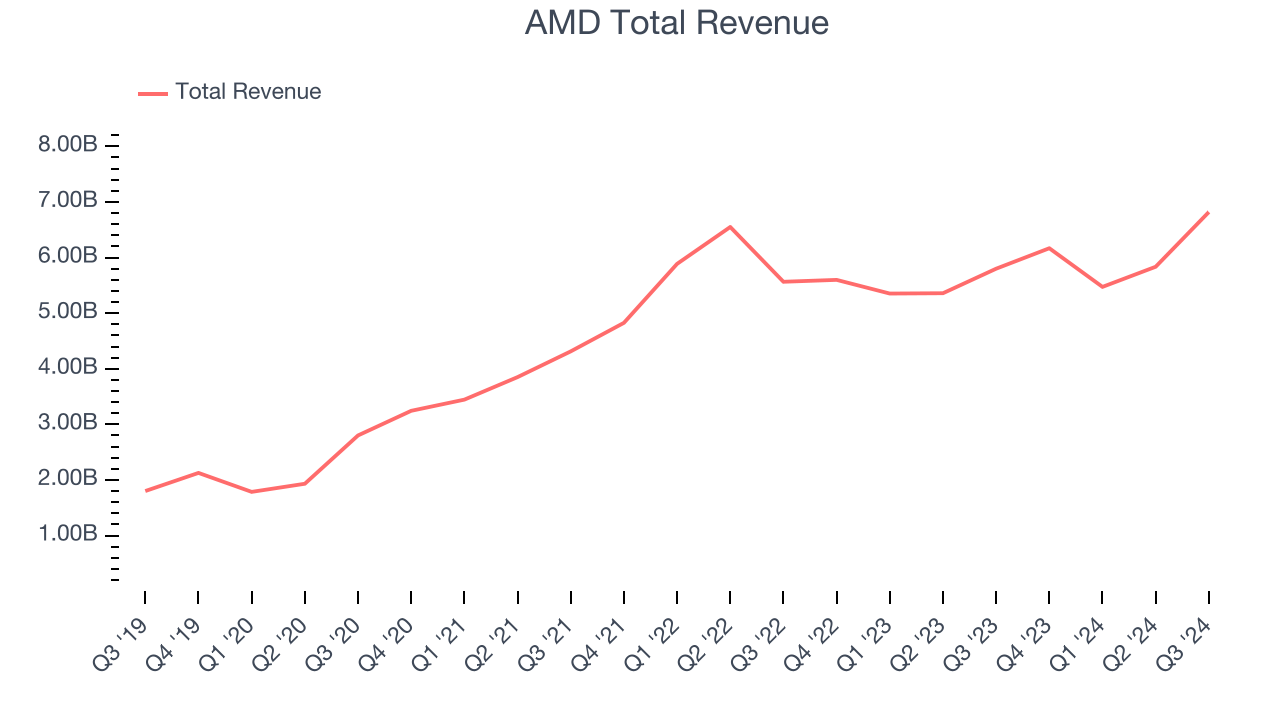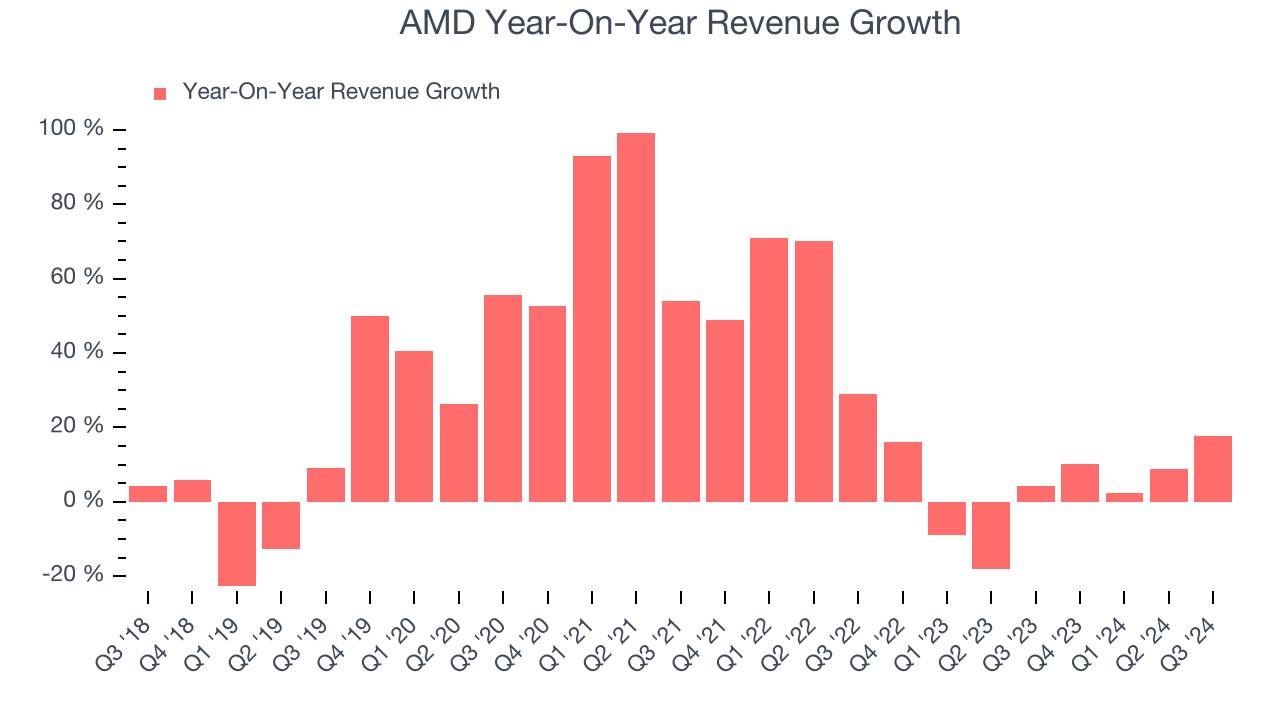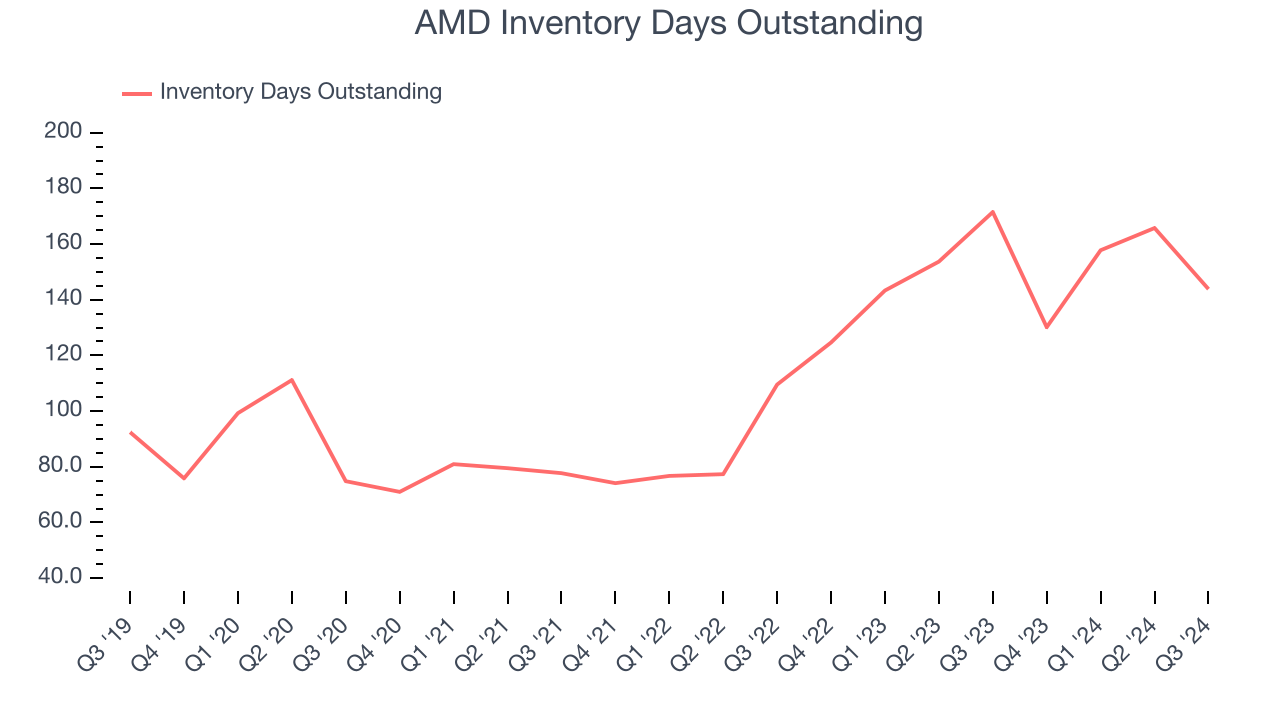
Computer processor maker AMD (NASDAQ:AMD) reported revenue ahead of Wall Street’s expectations in Q3 CY2024, with sales up 17.6% year on year to $6.82 billion. On the other hand, the company expects next quarter’s revenue to be around $7.5 billion, slightly below analysts’ estimates. Its non-GAAP profit of $0.92 per share wasin line with analysts’ consensus estimates.
Is now the time to buy AMD? Find out by accessing our full research report, it’s free.
AMD (AMD) Q3 CY2024 Highlights:
- Revenue: $6.82 billion vs analyst estimates of $6.71 billion (1.6% beat)
- Adjusted EPS: $0.92 vs analyst expectations of $0.92 (in line)
- EBITDA: $1.89 billion vs analyst estimates of $1.49 billion (27% beat)
- Revenue Guidance for Q4 CY2024 is $7.5 billion at the midpoint, below analyst estimates of $7.55 billion
- Gross Margin (GAAP): 50.1%, in line with the same quarter last year
- Inventory Days Outstanding: 144, down from 166 in the previous quarter
- Operating Margin: 10.6%, up from 3.9% in the same quarter last year
- EBITDA Margin: 27.7%, up from 24.8% in the same quarter last year
- Free Cash Flow Margin: 7.3%, up from 5.1% in the same quarter last year
- Market Capitalization: $258.8 billion
“We delivered strong third quarter financial results with record revenue led by higher sales of EPYC and Instinct data center products and robust demand for our Ryzen PC processors,” said AMD Chair and CEO Dr. Lisa Su.
Company Overview
Founded in 1969 by a group of former Fairchild semiconductor executives led by Jerry Sanders, Advanced Micro Devices or AMD (NASDAQ:AMD) is one of the leading designers of computer processors and graphics chips used in PCs and data centers.
Processors and Graphics Chips
The biggest demand drivers for processors (CPUs) and graphics chips at the moment are secular trends related to 5G and Internet of Things, autonomous driving, and high performance computing in the data center space, specifically around AI and machine learning. Like all semiconductor companies, digital chip makers exhibit a degree of cyclicality, driven by supply and demand imbalances and exposure to PC and Smartphone product cycles.
Sales Growth
Examining a company’s long-term performance can provide clues about its business quality. Any business can put up a good quarter or two, but the best consistently grow over the long haul. Thankfully, AMD’s 32.2% annualized revenue growth over the last five years was incredible. This is encouraging because it shows AMD’s offerings resonate with customers, a helpful starting point. Semiconductors are a cyclical industry, and long-term investors should be prepared for periods of high growth followed by periods of revenue contractions.

Long-term growth is the most important, but recency is neccessary for semiconductors because of Moore's Law, which suggests the pace of technological innovation is so high that yesterday's hit new product could be obsolete today. AMD’s recent history shows its demand slowed significantly as its annualized revenue growth of 3.2% over the last two years is well below its five-year trend. 
This quarter, AMD reported year-on-year revenue growth of 17.6%, and its $6.82 billion of revenue exceeded Wall Street’s estimates by 1.6%. Management is currently guiding for a 21.6% year-on-year increase next quarter.
Looking further ahead, sell-side analysts expect revenue to grow 28.1% over the next 12 months, an improvement versus the last two years. This projection is healthy and indicates the market thinks its newer products and services will spur faster growth.
Today’s young investors won’t have read the timeless lessons in Gorilla Game: Picking Winners In High Technology because it was written more than 20 years ago when Microsoft and Apple were first establishing their supremacy. But if we apply the same principles, then enterprise software stocks leveraging their own generative AI capabilities may well be the Gorillas of the future. So, in that spirit, we are excited to present our Special Free Report on a profitable, fast-growing enterprise software stock that is already riding the automation wave and looking to catch the generative AI next.
Product Demand & Outstanding Inventory
Days Inventory Outstanding (DIO) is an important metric for chipmakers, as it reflects a business’ capital intensity and the cyclical nature of semiconductor supply and demand. In a tight supply environment, inventories tend to be stable, allowing chipmakers to exert pricing power. Steadily increasing DIO can be a warning sign that demand is weak, and if inventories continue to rise, the company may have to downsize production.

This quarter, AMD’s DIO came in at 144, which is 34 days above its five-year average. These numbers suggest that despite the recent decrease, the company’s inventory levels are higher than what we’ve seen in the past.
Key Takeaways from AMD’s Q3 Results
We were impressed by AMD’s strong improvement in inventory levels. We were also excited its EBITDA outperformed Wall Street’s estimates. On the other hand, its revenue guidance for next quarter missed analysts’ expectations. The outlook is weighing on shares, and shares traded down 5.4% to $157.25 immediately following the results.
Should you buy the stock or not?If you’re making that decision, you should consider the bigger picture of valuation, business qualities, as well as the latest earnings. We cover that in our actionable full research report which you can read here, it’s free.
